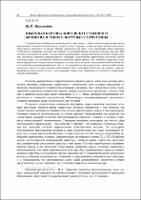Показать сокращенную информацию
Языковая картина мира искусственного билингва и этнокультурные стереотипы
| dc.contributor.author | Максимюк, Ж.В. | |
| dc.date.accessioned | 2020-10-06T09:38:11Z | |
| dc.date.available | 2020-10-06T09:38:11Z | |
| dc.date.issued | 2009 | |
| dc.identifier.citation | Максимюк, Ж. В. Языковая картина мира искусственного билингва и этнокультурные стереотипы / Ж. В. Максимюк // Веснік Брэсцкага універсітэта. Сер. філалагічных навук. Літаратуразнаўства. Мовазнаўства. – 2009. – № 1 (11). – С. 82–88. | ru_RU |
| dc.identifier.issn | 2072-9855 | |
| dc.identifier.uri | https://rep.brsu.by:443/handle/123456789/2638 | |
| dc.description | National language specific peculiarities and the social-historical and background of a certain lingual-ethnic group of people make up that specific light, which makes them see the objective reality in their own way. Each lingual culture have a set of unique stereotypic elements of their own which, as a rule, cannot be perceived by the representatives of another culture. When studying a foreign language in simulated communicative situation it is possible to get some country-specific background knowledge and cultural stereotypes, which, no doubt, will facilitate the process of communication. Nevertheless, the basic behaviour stereotypes of a certain lingual-ethnic group of people cannot be acquired by artificial bilinguals outside of the natural communicative environment. Such kind of stereotypes is absorbed from the lingual-cultural environment at the very beginning of socialization process by the native speakers of some lingual culture. An artificial bilingual always preserves his or her own national identity and ethnic-cultural stereotypes, no matter how high his communicative proficiency level is. | ru_RU |
| dc.description.abstract | Специфические особенности национального языка вместе с общественно-историческим опытом определенной лингвоэтнической группы людей создают «призму», сквозь которую данный этнос видит объективную реальность по-своему. Каждая лингвокультура имеет свой уникальный набор элементов стереотипного характера, которые, как правило, не воспринимаются носителями другой культуры. При изучении иностранного языка в искусственно-моделируемых коммуникативных условиях можно овладеть фоновыми знаниями страноведческого характера, культурными стереотипами носителей данной лингвокультуры, что, несомненно, облегчит коммуникативный процесс. Но глубинные стереотипы поведения определенной лингвоэтнической группы не могут быть усвоены искусственными билингвами вне естественной коммуникативной среды. Это то, что впитывается представителями национальной лингвокультуры с самого детства в процессе социализации. Искусственный билингв всегда сохраняет свою национальную идентичность и свои этнокультурные стереотипы, независимо от степени его коммуникативной компетенции. | ru_RU |
| dc.language.iso | ru | ru_RU |
| dc.publisher | БрГУ имени А.С. Пушкина | ru_RU |
| dc.relation.ispartofseries | Серыя філалагічных навук. Літаратуразнаўства. Мовазнаўства; | |
| dc.title | Языковая картина мира искусственного билингва и этнокультурные стереотипы | ru_RU |
| dc.title.alternative | Language Picture of the World of an Artificial Bilingual and Ethnic-Cultural Stereotypes | ru_RU |
| dc.type | Article | ru_RU |
